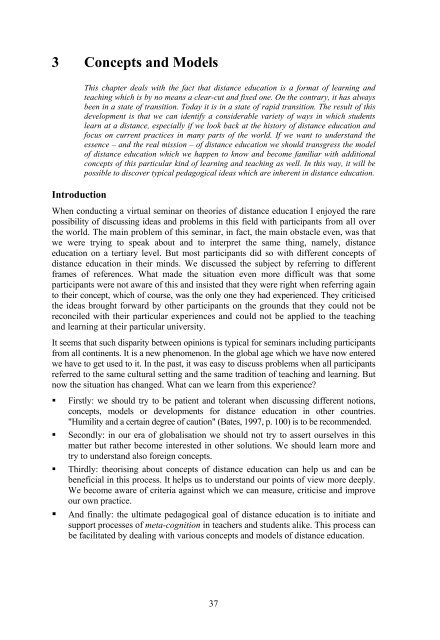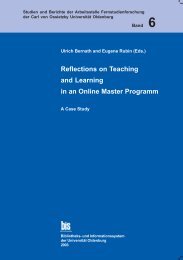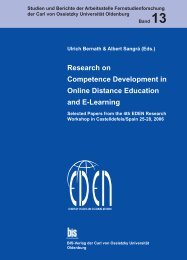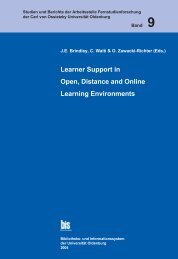Distance Education in Transition - Master of Distance Education ...
Distance Education in Transition - Master of Distance Education ...
Distance Education in Transition - Master of Distance Education ...
Create successful ePaper yourself
Turn your PDF publications into a flip-book with our unique Google optimized e-Paper software.
3 Concepts and Models<br />
Introduction<br />
This chapter deals with the fact that distance education is a format <strong>of</strong> learn<strong>in</strong>g and<br />
teach<strong>in</strong>g which is by no means a clear-cut and fixed one. On the contrary, it has always<br />
been <strong>in</strong> a state <strong>of</strong> transition. Today it is <strong>in</strong> a state <strong>of</strong> rapid transition. The result <strong>of</strong> this<br />
development is that we can identify a considerable variety <strong>of</strong> ways <strong>in</strong> which students<br />
learn at a distance, especially if we look back at the history <strong>of</strong> distance education and<br />
focus on current practices <strong>in</strong> many parts <strong>of</strong> the world. If we want to understand the<br />
essence – and the real mission – <strong>of</strong> distance education we should transgress the model<br />
<strong>of</strong> distance education which we happen to know and become familiar with additional<br />
concepts <strong>of</strong> this particular k<strong>in</strong>d <strong>of</strong> learn<strong>in</strong>g and teach<strong>in</strong>g as well. In this way, it will be<br />
possible to discover typical pedagogical ideas which are <strong>in</strong>herent <strong>in</strong> distance education.<br />
When conduct<strong>in</strong>g a virtual sem<strong>in</strong>ar on theories <strong>of</strong> distance education I enjoyed the rare<br />
possibility <strong>of</strong> discuss<strong>in</strong>g ideas and problems <strong>in</strong> this field with participants from all over<br />
the world. The ma<strong>in</strong> problem <strong>of</strong> this sem<strong>in</strong>ar, <strong>in</strong> fact, the ma<strong>in</strong> obstacle even, was that<br />
we were try<strong>in</strong>g to speak about and to <strong>in</strong>terpret the same th<strong>in</strong>g, namely, distance<br />
education on a tertiary level. But most participants did so with different concepts <strong>of</strong><br />
distance education <strong>in</strong> their m<strong>in</strong>ds. We discussed the subject by referr<strong>in</strong>g to different<br />
frames <strong>of</strong> references. What made the situation even more difficult was that some<br />
participants were not aware <strong>of</strong> this and <strong>in</strong>sisted that they were right when referr<strong>in</strong>g aga<strong>in</strong><br />
to their concept, which <strong>of</strong> course, was the only one they had experienced. They criticised<br />
the ideas brought forward by other participants on the grounds that they could not be<br />
reconciled with their particular experiences and could not be applied to the teach<strong>in</strong>g<br />
and learn<strong>in</strong>g at their particular university.<br />
It seems that such disparity between op<strong>in</strong>ions is typical for sem<strong>in</strong>ars <strong>in</strong>clud<strong>in</strong>g participants<br />
from all cont<strong>in</strong>ents. It is a new phenomenon. In the global age which we have now entered<br />
we have to get used to it. In the past, it was easy to discuss problems when all participants<br />
referred to the same cultural sett<strong>in</strong>g and the same tradition <strong>of</strong> teach<strong>in</strong>g and learn<strong>in</strong>g. But<br />
now the situation has changed. What can we learn from this experience?<br />
� Firstly: we should try to be patient and tolerant when discuss<strong>in</strong>g different notions,<br />
concepts, models or developments for distance education <strong>in</strong> other countries.<br />
"Humility and a certa<strong>in</strong> degree <strong>of</strong> caution" (Bates, 1997, p. 100) is to be recommended.<br />
� Secondly: <strong>in</strong> our era <strong>of</strong> globalisation we should not try to assert ourselves <strong>in</strong> this<br />
matter but rather become <strong>in</strong>terested <strong>in</strong> other solutions. We should learn more and<br />
try to understand also foreign concepts.<br />
� Thirdly: theoris<strong>in</strong>g about concepts <strong>of</strong> distance education can help us and can be<br />
beneficial <strong>in</strong> this process. It helps us to understand our po<strong>in</strong>ts <strong>of</strong> view more deeply.<br />
We become aware <strong>of</strong> criteria aga<strong>in</strong>st which we can measure, criticise and improve<br />
our own practice.<br />
� And f<strong>in</strong>ally: the ultimate pedagogical goal <strong>of</strong> distance education is to <strong>in</strong>itiate and<br />
support processes <strong>of</strong> meta-cognition <strong>in</strong> teachers and students alike. This process can<br />
be facilitated by deal<strong>in</strong>g with various concepts and models <strong>of</strong> distance education.<br />
37





